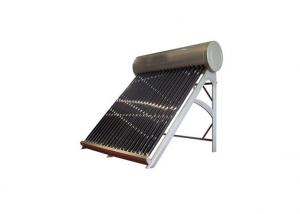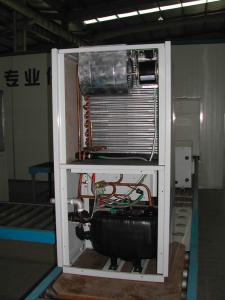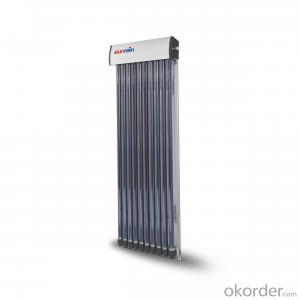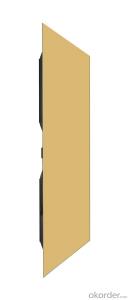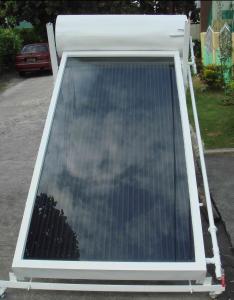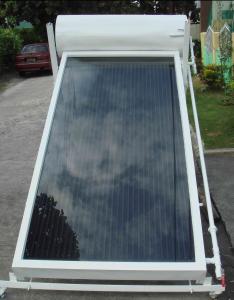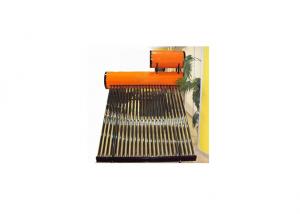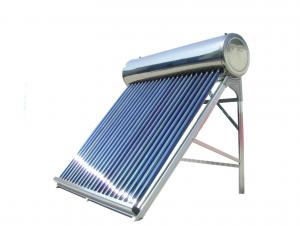Compact Solar Water Heater
- Loading Port:
- China Main Port
- Payment Terms:
- TT OR LC
- Min Order Qty:
- -
- Supply Capability:
- -
OKorder Service Pledge
Quality Product, Order Online Tracking, Timely Delivery
OKorder Financial Service
Credit Rating, Credit Services, Credit Purchasing
You Might Also Like
| Type | Evacuated Tube |
| Pressure | Unpressurized |
| Circulation Type | Other |
| Heating System | Thermosyphon (Passive) |
| Connection Type | Direct-Plug |
| Certification | CE, Solar Keymark, SABS |
| Model Number | TZ58/1800-10,15,20,24,30 |
| Recommend region | Asia, Africa, Latin America |
Key points
Inner tank: stainless steel SUS304-0.5mm
Vacuum tube: QB-AL-N/AL-47-1500/58-1800
Outer tank: painted steel-0.4mm/aluminum-zinc coated steel-0.45mm/stainless steel SUS304
Insulation: polyurethane
Frame: coated galvanized steel-1.5mm/stainless steel SUS430-1.5mm
- Q:How does a solar water heater affect the overall energy consumption of a household?
- A solar water heater can significantly reduce the overall energy consumption of a household. By harnessing the sun's energy to heat water, it eliminates the need for traditional energy sources like gas or electricity to power a water heater. This results in lower energy bills and a reduced environmental impact. The solar water heater's impact on energy consumption will depend on factors such as the size of the system, the climate, and the household's hot water usage.
- Q:How much does it cost to replace the solar panels in a solar water heater?
- The cost to replace the solar panels in a solar water heater can vary depending on various factors such as the type and size of the panels, the brand, and the installation method. On average, the cost can range from $500 to $5,000 or more. It is recommended to consult with a professional installer to get an accurate estimate based on your specific requirements and location.
- Q:How does a solar water heater perform in areas with frequent power outages?
- A solar water heater performs exceptionally well in areas with frequent power outages. Since it relies on the sun's energy to heat water, it remains unaffected by power cuts. This ensures a continuous supply of hot water even when there is no electricity, making it an ideal solution for areas with unreliable power grids.
- Q:Can a solar water heater be used for swimming pool heating?
- Yes, a solar water heater can be used for swimming pool heating. Solar water heaters work by collecting energy from the sun and using it to heat water. This heated water can then be circulated through the swimming pool, raising its temperature. Solar water heaters are an environmentally friendly and cost-effective way to heat swimming pools, as they utilize renewable energy from the sun. They can be particularly effective in warmer climates where there is ample sunlight throughout the year. However, in colder climates or during winter months, a solar water heater may not be sufficient to heat the pool to the desired temperature. In such cases, a backup heating system may be required. Overall, a solar water heater can be a great option for swimming pool heating, providing an energy-efficient and sustainable solution.
- Q:How does the type of solar collector affect the performance of a solar water heater?
- The type of solar collector used in a solar water heater directly affects its performance. Different types of collectors, such as flat plate collectors or evacuated tube collectors, have varying efficiencies in capturing and converting solar energy into heat. Factors such as the surface area, materials used, insulation, and design of the collector impact its ability to absorb sunlight and transfer heat to the water. Therefore, the selection of the appropriate solar collector is crucial in optimizing the performance and efficiency of the solar water heater system.
- Q:What is the average water temperature achieved by a solar water heater?
- The average water temperature achieved by a solar water heater depends on various factors such as the geographical location, time of year, and the design and efficiency of the system. However, on average, solar water heaters can heat water to temperatures ranging from 120 to 140 degrees Fahrenheit (49 to 60 degrees Celsius).
- Q:Make a comparison between two brands of mulberry and Chery
- Second, liner thickness. The quality of the liner determines the life of the water heater, if the water tank, the water heater will be scrapped. Major brand manufacturers use thickness of not less than 0.5mm of SUS304 food grade stainless steel liner. Argon arc welding is adopted to ensure the service life can reach more than 15 years. Other brands of water heaters in the liner between 0.2mm-0.4mm, the use of a period of time there will be water leakage problem. Therefore, consumers in the purchase of products must ask the thickness of the liner. At the same time, but also beware of patch water tank, the water tank liner is made up of a number of scrap steel belt, the entire inner bladder welding as many as dozens of times. Such a water tank, not only poor quality, but also may cause damage to the health of consumers with bacteria.
- Q:Can you install a solar water heater on the first floor
- Solar (solar energy), refers to the sun's heat radiation energy (see heat energy in three ways: radiation), the main performance is often said that the sun's rays
- Q:How does the tilt angle of the solar collector affect the performance of a solar water heater?
- The performance of a solar water heater is greatly influenced by the angle at which the solar collector is tilted. The tilt angle is responsible for determining how efficiently the collector can capture solar radiation. Ideally, the best tilt angle for a solar collector is the same as the latitude of the installation location. This allows the collector to receive the maximum amount of solar radiation all year round. However, this may not always be feasible due to factors like aesthetics, limited space, or building restrictions. When the collector is set at the optimal tilt angle, the solar water heater can effectively absorb and convert energy. This results in more solar radiation being captured, leading to higher water temperatures and improved overall performance. If the tilt angle is too steep, the collector may receive an excessive amount of solar radiation during peak hours, causing the system to overheat and potentially decrease efficiency. On the other hand, if the tilt angle is too shallow, the collector may not receive enough solar radiation, leading to lower water temperatures and reduced performance. The tilt angle of the solar collector also has a seasonal impact on its performance. In winter months when the sun is lower on the horizon, a steeper tilt angle can help capture more sunlight. Conversely, during summer months when the sun is higher, a shallower tilt angle can be more effective. It is important to recognize that while selecting the optimal tilt angle can greatly enhance the performance of a solar water heater, other factors such as shading, orientation, and the quality of the collector itself also play crucial roles. Therefore, a thorough evaluation of these factors should be conducted before determining the most suitable tilt angle for a solar water heater installation.
- Q:Are there any environmental benefits of using a solar water heater?
- Yes, there are several environmental benefits of using a solar water heater. Firstly, solar water heaters rely on the sun's energy to heat water, reducing the need for fossil fuel-based electricity or gas. This significantly decreases greenhouse gas emissions, leading to a substantial reduction in carbon footprints. Additionally, solar water heaters do not produce any air pollution or contribute to smog formation, improving air quality. Furthermore, they help conserve natural resources by reducing the demand for non-renewable fossil fuels. Overall, solar water heaters are a sustainable and eco-friendly solution that helps mitigate climate change and protect the environment.
1. Manufacturer Overview |
|
|---|---|
| Location | |
| Year Established | |
| Annual Output Value | |
| Main Markets | |
| Company Certifications | |
2. Manufacturer Certificates |
|
|---|---|
| a) Certification Name | |
| Range | |
| Reference | |
| Validity Period | |
3. Manufacturer Capability |
|
|---|---|
| a)Trade Capacity | |
| Nearest Port | |
| Export Percentage | |
| No.of Employees in Trade Department | |
| Language Spoken: | |
| b)Factory Information | |
| Factory Size: | |
| No. of Production Lines | |
| Contract Manufacturing | |
| Product Price Range | |
Send your message to us
Compact Solar Water Heater
- Loading Port:
- China Main Port
- Payment Terms:
- TT OR LC
- Min Order Qty:
- -
- Supply Capability:
- -
OKorder Service Pledge
Quality Product, Order Online Tracking, Timely Delivery
OKorder Financial Service
Credit Rating, Credit Services, Credit Purchasing
Similar products
New products
Hot products
Hot Searches
Related keywords


